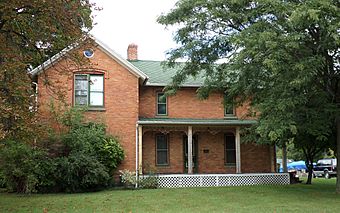H. Elmer Thayer House facts for kids
Quick facts for kids |
|
|
H. Elmer Thayer House
|
|
 |
|
| Location | G-3202 Court St., Flint, Michigan |
|---|---|
| Area | less than one acre |
| Built by | Henry Crow, George Utley |
| Architectural style | Italianate |
| MPS | Genesee County MRA |
| NRHP reference No. | 82000530 |
| Added to NRHP | November 26, 1982 |
The H. Elmer Thayer House is a special old home located in Flint, Michigan. It was added to the National Register of Historic Places in 1982. This means it's an important building worth protecting because of its history and unique style.
A Glimpse into the Past
The land where this house stands has a long history. It was first owned by Jacob Smith, who was one of the very first European settlers in the Flint area. He later gave the land to Petabonaqua, who was the daughter of a man named Col. Lewis Beaufait and a Native American woman.
Over the years, the property was owned by several important people in Michigan. These included Stevens T. Mason, who was the very first governor of the State of Michigan. Grant Decker, who became the first mayor of Flint, also owned the land.
It's not exactly clear when the house was built. It was probably constructed sometime between 1873 and 1889. Builders like George L. Utley, Henry Crow, or E. R. Cookingham might have built it. We know for sure that H. Elmer Thayer was the first owner who lived in the house. He was the supervisor for Flint Township from 1893 to 1902.
What Does the House Look Like?
The H. Elmer Thayer House is a two-story building made of red bricks. It has a special "L" shape when you look at it from above. The house is built in the Italianate style, which was popular in the late 1800s.
The doors and windows have decorative tops. These are made from double brick arches that are slightly curved. These arches are the main decorations and give the house its Italianate look. In front of the house, there is an open porch called a veranda. It is supported by columns that are shaped and decorated. This porch is a newer version of the original one, which was damaged over time.

